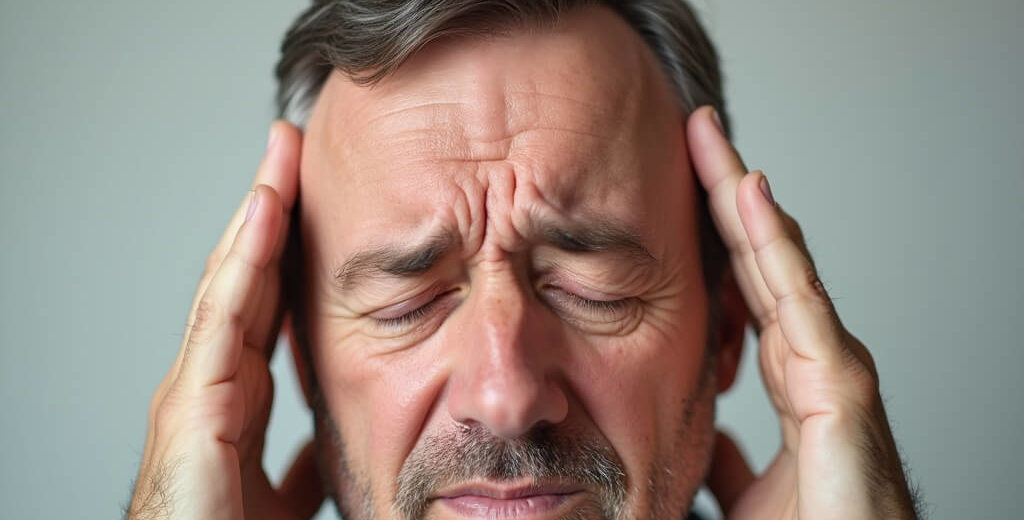Occasional dizzy spells – or feelings of lightheadedness, wooziness, or being off-balance – are a relatively common experience. Most adults will experience it at some point, and vertigo (a spinning sensation) affects an estimated 40% of people at least once in their lifetime1. While it’s common to experience some temporary dizziness, persistent or severe dizziness can be very disruptive to your daily life, making it hard to concentrate or focus on simple tasks. It can even lead to injury if you suddenly feel disoriented or lose your balance.
There are many causes of dizziness, including inner ear problems, blood pressure issues, migraines, or a reaction to medication. Surprisingly, some dizziness or vertigo can be caused by your brain. It can arise from disruptions in your brain’s ability to process sensory information related to balance. The good news is that brain-based dizziness or vertigo is often treatable.
Understanding Dizziness
There are different types of dizziness, and many variations of these different types. In simple terms, dizziness usually falls into one of these categories: vertigo, lightheadedness, presyncope, or disequilibrium2. Each of these types of dizziness has a unique set of symptoms and causes, and most can be broken down into smaller subcategories.
- Vertigo: This type of dizziness involves a false sense of motion or spinning. There are two types of vertigo, peripheral and central vertigo. Peripheral vertigo is caused by a problem in part of the inner ear, while central vertigo is caused by a problem in the brain – usually in the brain stem or cerebellum3.
- Lightheadedness: This is a general feeling of being lightheaded or having a faint sensation in the head. It can be caused by a variety of factors, including dehydration, low blood sugar, or anxiety.
- Presyncope: This is the sensation of an impending loss of consciousness (syncope). It is primarily caused by a temporary reduction in blood flow to the brain. It can be accompanied by other symptoms like weakness, sweatiness, or heart palpitations.
- Disequilibrium: This is a feeling of being off-balance, unsteady, or having difficulty maintaining your balance. It can be caused by problems with the inner ear, the brain, or the nervous system.
Dizziness has many symptoms and many causes. Often, it is relatively minor and temporary. Other times it can be more severe and have a real impact on your quality of life.
How the Brain Contributes to Dizziness
Many types of dizziness can be directly linked to how the brain processes balance and spatial awareness. Some dizziness can even be a sign of a serious neurological disorder. While most often, dizziness is not something to be concerned about, if it is severe and/or ongoing, it is important to rule out the possibility of a serious medical condition like a TIA (Transient Ischemic Attack) or stroke. If the dizziness is accompanied by other symptoms like slurred speech, numbness, severe head pain or sudden vomiting, seek medical attention.
More often, neurological sources of dizziness are less serious than TIAs and strokes. Some other neurological conditions for which dizziness can be a symptom include:
- Benign Paroxysmal Positional Vertigo (BPPV): This particular type of vertigo can occur when a small crystal of calcium in the ear moves and signals to your brain that your body is spinning or swaying when it’s not.
- Meniere’s Disease: This disorder is caused by excess fluid in the inner ear, and can often cause dizziness along with hearing symptoms like tinnitus.
- Vestibular Migraine: Vestibular migraines can often cause dizziness along with other traditional migraine symptoms.
- Vestibular Neuritis: If a viral infection causes nerve damage to your inner ear, this can cause a condition known as vestibular neuritis, which is often accompanied by a feeling of dizziness.
Fortunately, the types of dizziness caused by the brain are often treatable without medication or surgery. Safe, effective, non-invasive techniques have been used to treat these conditions and many others for decades.
The Role of Physical Therapy
Brain-related dizziness can often be assessed by a professional physical therapist. Vestibular and balance assessments can help a therapist identify the source of your dizziness, and can help them create a personalized treatment plan using evidence-based techniques to mitigate or relieve your symptoms. A particular type of physical therapy known as vestibular rehabilitation therapy (VRT) has been demonstrated to successfully treat the neurological conditions listed above and many others – including stroke and traumatic brain injury4.
Vestibular rehabilitation therapy employs various exercises and techniques to help manage dizziness and balance issues. These can include balance retraining exercises, gaze stabilization exercises, and habituation exercises for motion sensitivity. Depending on your condition and the specific cause of your dizziness, your physical therapist will develop a customized treatment plan and adjust it as needed during your recovery.
While dizziness and lightheadedness are common and don’t typically indicate a more serious condition, anyone who has experienced severe episodes or chronic dizziness knows how devastating it can be to your quality of life. If you or someone you know is suffering from dizziness or balance issues, don’t hesitate to contact us and schedule a consultation. A professional assessment can help you better understand your situation, and the sooner you start treatment, the sooner you can get back to your normal life. We’re ready to help!
Sources
- “Is It Vertigo? Possible Causes of Dizziness Explained.” Henry Ford Health – Detroit, MI, henryford.com/blog/2024/11/is-it-vertigo-possible-causes-of-dizziness-explained. Accessed 6 May 2025.
- “Conditions.” Emory Dizziness and Balance Center – Conditions and Types, emoryhealthcare.org/centers-programs/dizziness-balance-center/conditions. Accessed 7 May 2025.
- “Vertigo.” org, www.pennmedicine.org/for-patients-and-visitors/patient-information/conditions-treated-a-to-z/vertigo. Accessed 7 May 2025.
- “Vestibular Rehabilitation Therapy: What It Is & Exercises.” Cleveland Clinic, 19 Mar. 2025, clevelandclinic.org/health/treatments/15298-vestibular-rehabilitation.





